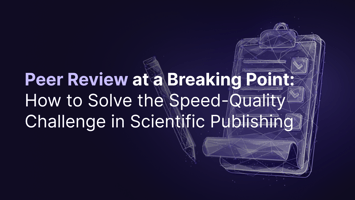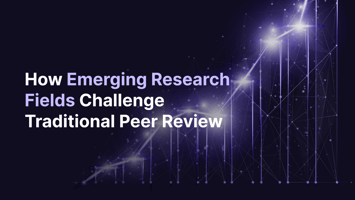The scientific publishing world faces a critical inflection point. With review processes stretching...
The Economic Impact of AI-Powered Peer Review Process in Scientific Publishing
When we sit down with scientific publishers and research funding agencies, the conversation inevitably shifts from features and technical capabilities to a more fundamental question: "What's the real economic impact of modernizing your peer review process?"
It's a question worth asking. In our work with clients across the scientific publishing landscape, we've uncovered that the peer review process represents one of the most resource-intensive operations these organizations manage—yet few have quantified its true cost until after implementing an AI solution.
The Hidden Cost Structure of Traditional Peer Review
Most publishing executives can readily identify the obvious costs of peer review—editorial staff time, reviewer honoraria, manuscript management systems. What remains largely invisible, however, are the cascading economic effects:
- Extended time-to-publication cycles directly delay revenue generation
- Reviewer fatigue and declining acceptance rates create unpredictable timelines
- Manual conflict-of-interest verification introduces compliance and reputational risks
- Limited reviewer diversity impacts research quality and representation
When we analyze workflow data with clients, we consistently find an imbalanced workload distribution. A small percentage of experts typically handle the majority of reviews, creating bottlenecks that affect the entire publication process.
This imbalance doesn't just slow down publications—it fundamentally restricts what your organization can accomplish. Let us share what we've learned about the true economics at play.
Four Economic Value Pillars of AI-Powered Reviewer Search and Matching
Through our client implementations, we've identified four distinct dimensions where AI-Powered reviewer search and matching delivers measurable economic value:
1. Time Economics: From Weeks to Hours
The most immediate economic benefit comes from dramatic time compression:
- Automated semantic matching between manuscripts and qualified reviewers
- Instant conflict detection based on co-authorship and affiliation data
- Filter-based search capabilities that narrow options by expertise, geography, and career stage
Here's a concrete example: One research funding agency we work with was struggling to distribute 400 grant applications among 120 experts—a process consuming approximately three weeks of manual work. Their team had to sort applications into topic clusters, select appropriate experts, create balanced panels, and ensure proper distribution while managing conflicts of interest and diversity requirements.
After implementing Prophy Panel Composer, the same process now takes just a few hours, with the entire procedure—including all communication—completed in three days.
But the real value isn't just the time saved. It's what your highly-trained specialists can do with that recovered time—activities that directly drive your core mission and revenue.
2. Financial Optimization: Direct Resource Reallocation
The financial impact materializes through several operational improvements:
- Reduced administrative overhead for managing review processes
- Accelerated publication cycles that speed revenue generation
- Lower reviewer recruitment costs through higher first-time acceptance rates
When we talk about saving time, we're really talking about saving money—these concepts are functionally equivalent in organizational economics. Rather than focusing on abstract ROI terminology, we emphasize concrete cost reductions our clients experience.
For publishers specifically, the equation is straightforward: every hour your editors spend hunting for reviewers is an hour they're not developing content that generates revenue. This opportunity cost often exceeds the direct costs of the review process itself.
3. Innovation Capacity: Scaling Without Proportional Resources
By freeing editorial and administrative resources from mechanical reviewer selection, organizations gain capacity for strategic growth:
- Launch specialized publications without proportional staff increases
- Handle submission surges without compromising quality standards
- Develop new editorial products that generate additional revenue streams
We've seen clients redirect resources from reviewer management to launching entirely new journals or funding programs—initiatives that would have been impossible under their previous resource constraints.
4. Risk Mitigation: Quantifiable Quality Improvements
The economic value of reduced risk is substantial though frequently underestimated:
- Fewer missed conflicts of interest that could necessitate retractions
- More diverse reviewer pools that enhance research integrity and representativeness
- Better compliance with governance requirements and diversity objectives
In one case we encountered, a client had allocated grant review to an expert whose publication record in the relevant field was over five years old. Our Referee Finder allows filtering by publication recency, ensuring only current experts are selected—directly impacting research quality and funding outcomes.
The Strategic Value Trifecta
Beyond these four pillars, our clients consistently emphasize three strategic capabilities that differentiate AI-powered peer review—each with significant economic implications:
Predictability in Peer Review Operations
Organizations using our tools gain unprecedented operational predictability. Rather than hoping qualified reviewers accept invitations, publishers can forecast acceptance rates and review timelines with greater accuracy—allowing for more efficient resource allocation and publication planning.
Scalability Without Linear Cost Increases
Traditional peer review typically requires proportional staffing increases as submission volumes grow. AI-powered systems fundamentally change this equation by providing scalability without corresponding personnel additions.
This capability proves particularly valuable during annual submission peaks, special issue development, and new journal launches. We've seen publishers absorb submission volume increases without adding staff by implementing our tools.
Control Over Strategic Resources
Perhaps most significantly, organizations gain greater control over how they deploy their most valuable assets—their expert staff and editorial resources.
Even with highly specialized topics where finding qualified reviewers would be exceptionally difficult manually, our solution keeps the process controlled and efficient. Access to Prophy's extensive database means finding appropriate experts remains manageable regardless of subject matter complexity.
Transforming Abstract Benefits into Measurable Metrics
One powerful aspect of AI-powered review systems is their ability to transform previously abstract concepts into concrete, measurable parameters.
Quality reviewing isn't just an abstract goal anymore—it becomes a measurable parameter. We can quantify how relevant reviewers are based on semantic similarity, geographic distribution, career stage, and other key metrics. If something wasn't being measured before, it can be measured now, and much more easily.
This capability enables organizations to move from subjective assessments to data-driven decision-making across their entire publication or grant process.
Is Your Organization Ready for the Economic Shift?
For scientific publishers and research funders, the question isn't theoretical—it's practical: Can your organization afford to have valuable intellectual resources spending hours hunting for reviewers when competitors complete the same tasks in minutes?
In an industry facing increasing submission volumes, reviewer fatigue, and fierce competition for quality content, the economic advantage of AI-powered peer review systems delivers compelling value that impacts both top and bottom lines.
The conclusion we share with executives is straightforward: The question isn't whether you can afford to implement AI-powered peer review systems—it's whether you can afford not to.
See the Economic Impact for Yourself
Ready to uncover your hidden opportunities? Book a 30-minute demo where we'll analyze your current workflow, demonstrate our technology in action, and provide a custom assessment of your potential savings.
Prophy's Referee Finder helps scientific publishers and funding agencies efficiently identify the right reviewers for manuscripts and grant proposals. Our AI-powered platform uses semantic matching and comprehensive filtering to transform peer review management while ensuring the highest standards of research integrity.
.png?width=337&height=96&name=Logo%20(1).png)





.png?height=200&name=Blog%20Cover%20-%20The%20Hidden%20Causes%20of%20Inefficient%20Peer%20Reviewer%20Search%20(And%20How%20to%20Fix%20Them).png)